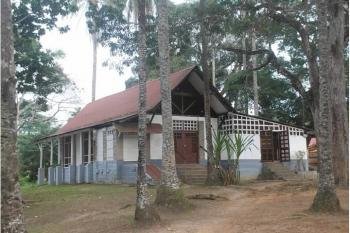Gabon
Ancien Hôpital Albert Schweitzer de Lambaréné
Site Info
Official Information
- Full Name
- Ancien Hôpital Albert Schweitzer de Lambaréné (ID: 5418)
- Country
- Gabon
- Status
-
Removed from tentative list 2022
Site history
History of Ancien Hôpital Albert Schweitzer de Lambaréné
- 2022: Removed from Tentative List
- Removed from tentative list
- 2009: Added to Tentative List
- Added to tentative list
- Type
- None
- Criteria
Links
All Links
No links available.
Community Information
Travel Information
Recent Connections
News
No news.
Recent Visitors
Visitors of Ancien Hôpital Albert Schweitzer de Lambaréné
Community Reviews
Show full reviewsMichael Novins
Ancien Hôpital Albert Schweitzer de Lambaréné
Ancien Hôpital Albert Schweitzer de Lambaréné (Removed from tentative list)

In August 2012, I visited Lopé National Park. I had planned on returning to Libreville by train on the Train Omnibus l'Equateur, which was scheduled to arrive at Lopé station at 2:55am, and then travel overland from Libreville to Lambaréné to visit the Albert Schweitzer Hospital. The Trans-Gabon Railway didn't arrive at Lopé until eight hours or so after it was scheduled, so instead of returning to Libreville, I decided to get off the train at Ndjolé, the nearest station to Lambaréné. Very few people departed at Ndjolé and I'm pretty sure I was the only tourist who got off at that station, where there were no services or taxis.
Before departing from Lopé, I contacted my agent in Libreville and requested that she arrange for my driver to meet me at Ndjolé, which he did, albeit a few hours late (apparently he suffered at least one flat tire), which I spent as the lone passenger at Ndjolé station. From Ndjolé, it was a two-hour drive to Lambaréné.
I stayed at L'Hôtellerie de l'Hôpital Albert Schweitzer, which is located on the grounds of the Albert Schweitzer Hospital. I spent the next day visiting the museum (which displays Dr. Schweitzer's bedroom, piano and library), Dr. Schweiter's grave and a cage containing a pelican (Dr. Schweitzer apparently kept a pet pelican, named Parsifal, although that was not the specimen in the cage).
It took approximately four hours to drive from Lambaréné to Libreville (the drive was frequently interrupted by local authorities, each …
Keep reading 0 comments